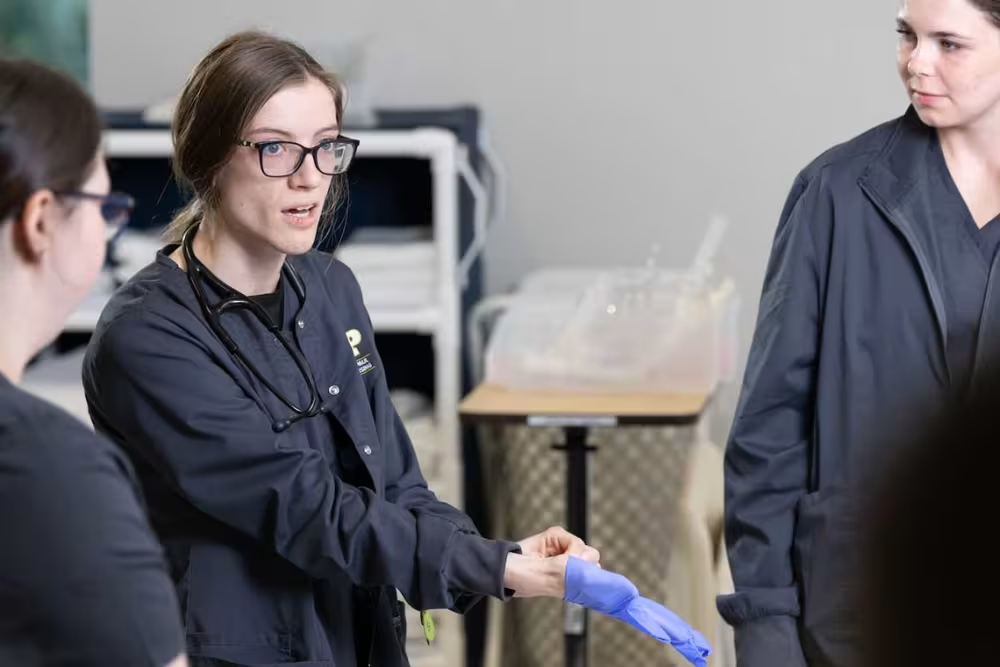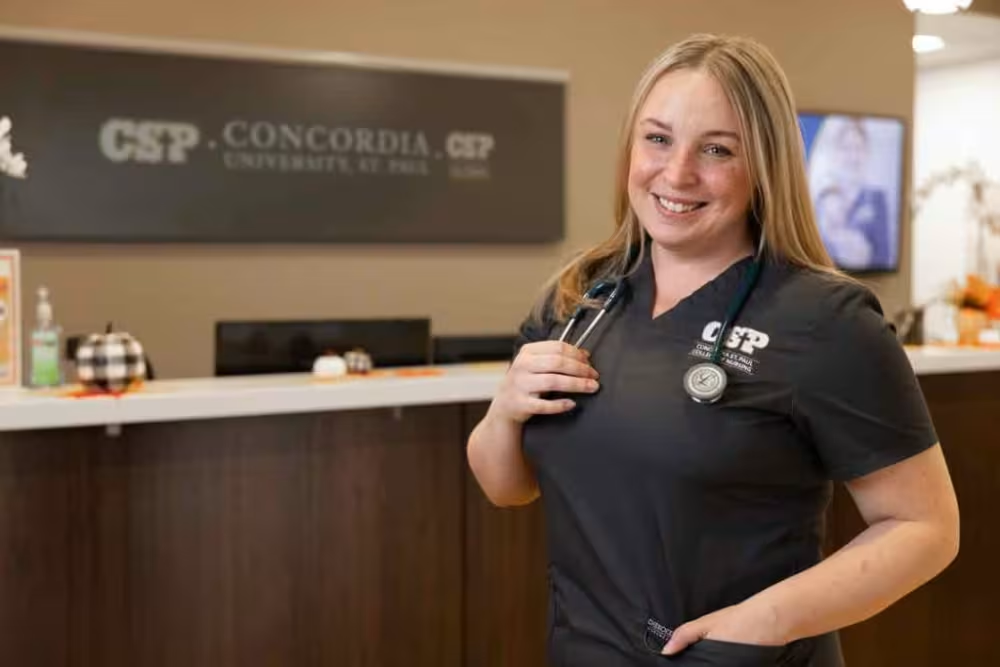How to Be Successful in Nursing School: 12 Tips
Each blog post is dated and contains accurate information as of that date. Certain information may have changed since the blog post publication date. If you would like to confirm the current accuracy of blog information, please visit our ABSN overview page or contact admissions at 866-892-1562.
Learning how to be successful in nursing school requires dedication and elements like holding yourself accountable, making studying a habit, showing up prepared, learning from your mistakes, setting a schedule, taking advantage of learning opportunities, and using available counseling services.

Starting nursing school is an exciting choice, especially when you’ve entered the fast-paced path of an accelerated program. These programs, like the Accelerated Bachelor of Science in Nursing (ABSN) program at Concordia University, St. Paul, deliver a condensed curriculum with plenty of instructor support in as few as 16 months.
To be successful in such a fast-paced nursing program, you should follow tips like attending each class and lab prepared, holding yourself accountable, and sticking to your study schedule. When considering how to be successful in nursing school, the most important thing is to maintain your commitment to your goal of becoming a nurse. Let’s review some of the most valuable tips for nursing students.
1. Hold Yourself Accountable
Accelerated nursing school takes grit and tenacity. You’ll need to prioritize school and stick to your goals.
Staying self-motivated and accountable is particularly important because nursing coursework is delivered online. This provides flexibility but also requires more self-driven study. You’ll need to set time aside each day to work through the course materials and meet your deadlines. You can always reach out to ABSN faculty or academic advisors if you need help.

Wondering if nursing school is worth it? Consider these six factors to help you decide if the ABSN program is right for you.
2. Make Studying a Habit
Succeeding in nursing school requires daily studying, so create a routine built around your studies. To better retain material, plan on having multiple short study sessions over the course of a day as opposed to one long study session.
It may take a few weeks to get into the routine of studying, so give yourself time to adjust to the new normal. Students generally spend 40-plus hours attending classes and labs and studying each week, so be prepared to have this be your major focus throughout your nursing school journey.
Curious how nursing school works in an accelerated BSN program?

3. Show Up Prepared
How to succeed in nursing school also means showing up prepared when you have in-person learning experiences. Before attending skills labs, make sure you have completed the assigned coursework. The coursework you complete each week will inform your skills labs, which help you prepare for your clinical learning experiences.
4. Learn From Your Mistakes
Nursing school requires a considerable learning curve. You’ll likely make mistakes during your labs, but that’s acceptable and expected because you can learn from them before working with real patients. Skills labs provide the opportunity to practice in a supportive environment.
Following each clinical learning experience, your group will participate in debriefing sessions in which you’ll discuss how you performed and how you can improve. This allows you to learn from scenarios you participated in and those that other students participated in. This is part of encouraging a growth mindset and reflective practice.
5. Put in Extra Practice Time During Labs
You’ll have time to practice nursing skills, like IV insertion, during each skills lab. You might feel that you need extra time to practice, however. The skills labs will remain open after your lab session so that you can practice your new skills as many times as needed to develop proficiency and confidence.

6. Set a Schedule and Establish Goals
There are plenty of nursing school tips that are most effective when implemented from the start, including establishing goals and a daily study schedule. This will help keep you on track with studying and completing assignments. It will also ensure you remember what you learned during in-person labs and clinical learning experiences.
7. Actively Solicit Feedback During Clinical Experiences
Clinical learning experiences are an opportunity to interact with actual patients and provide care under supervision. When you’re completing a clinical learning experience, bring an open mind. Ask questions, take notes, and actively solicit feedback. In many ways, you are the architect of your own clinical learning experience, and regardless of the setting, there is always something to learn or someone with a unique background that can help your growth.
8. Take Advantage of Additional Learning Opportunities
Being successful in nursing school can also include studying additional materials not required in courses. In your textbooks, for example, you’ll find links to supplementary interactive case studies available online. You can similarly search for free online nursing tutorials, and there are also plenty of NCLEX-RN prep apps and websites.
Learn more about how online learning can benefit you in nursing school.

9. Use the Counseling Services Available to You
One of the most important nursing school tips is to take care of your mental health. All Concordia University, St. Paul, students are encouraged to take advantage of the free academic, career, mental health, and personal services available to them at the counseling center.
Throughout your ABSN program, seek assistance from instructors, success coaches, and others who are here specifically to help you excel in nursing school. Everyone needs to be able to talk about their experiences and connect with others. If you’re overwhelmed during nursing school, it’s important to be able to manage that stress. Clubs like the Student Nurses Association also have social and community service events, which can help build camaraderie between you and your fellow cohort members.
10. Join or Form a Study Group
Joining a study group is a great way to make studying more engaging and interactive. It can also help you develop friendships with other members of your nursing cohort. Essentially, it creates a stronger support network that you can lean on through the challenges of the program.

11. Don’t Hesitate to Ask Questions
You won’t necessarily understand every nursing concept or skill the first time it’s explained, and that’s perfectly fine. When something is confusing, ask your instructor for clarification. If you’re working a clinical shift, you might not always be able to ask questions right away. Write them down to ask later.
12. Study for the NCLEX-RN Well in Advance
It’s best to start studying for the NCLEX-RN as soon as possible. This exam determines whether you can gain licensure, so being as prepared as possible is crucial. Spend some time each day answering practice questions and reviewing concepts. Take advantage of CSP’s NCLEX prep resources and speak with Academic Success Coaches for further support.
Don’t Put Off a Rewarding Career in Nursing
Life as an accelerated nursing student can be challenging, but it will be worth it when you graduate ready to sit for the NCLEX-RN. The learning you will do is active, so you can apply the content to a variety of situations, just like actual nursing care.

If you feel called to a career in nursing, don’t wait. Contact an admissions advisor today to find out how you can earn your BSN degree in as few as 16 months with Concordia University, St. Paul’s ABSN program.
